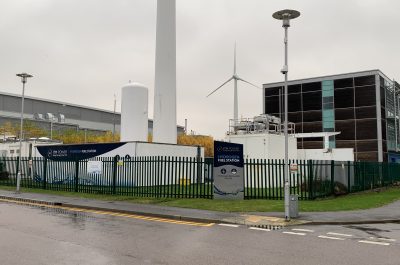Reaching out ‘beyond the wires’: 2024 Regulation Seminar
Energy Networks Australia’s 2024 Regulation Seminar saw a meeting of over 200 minds across a diverse group from networks, government, regulatory and market bodies, consumer advocates and investor voices, discussing the significant challenges and opportunities facing regulating energy networks.
The 2024 theme was Beyond the Wires: Regulation Delivering for Customers, focusing on how the regulation of energy networks can enable the clean energy transition and deliver the outcomes customers want.
The seminar offered a comprehensive exploration of the evolving landscape of energy regulation, with a focus on the challenges and opportunities presented by the transition to renewable energy. The seminar featured insightful presentations from key industry figures, which we’ll explore further, below.
Keynote address by Daniel Duma: International perspectives on network regulation meeting the transition
International keynote speaker Daniel Duma of the Centre on Regulation in Europe (CERRE) provided perspectives on the emerging trends in network regulation across Europe. His presentation emphasised the need for regulation to become more flexible, adaptable, and focused on continuous learning. Daniel highlighted the intricate trade-offs involved in ensuring that consumers and communities receive the services they need during the energy transition.
One of his key points was about the challenging balance required in this period of change. He pointed out that regulators, consumers, and networks across the globe face common issues, such as the integration of renewable energy sources and the need to maintain reliable and affordable energy supplies. By drawing on experiences and lessons from Europe, Duma underscored the importance of a regulatory framework that can evolve in response to the dynamic nature of the energy sector.
Read the Centre on Regulation in Europe (CERRE’s) report: Towards a more dynamic regulation for energy networks.
AER Chair’s Challenge: Optimising the existing grid
Australian Energy Regulator Chair, Clare Savage provided the keynote regulator’s address and challenged the audience to consider how best to use existing grid infrastructure while driving optimal outcomes for customers. She reinforced the AER’s openness to greater flexibility and innovative approaches, citing its track record with ‘regulatory sandbox’ applications. This initiative allowed for experimental projects to test new ideas in a controlled environment, providing a pathway for innovative solutions to be implemented more broadly,
She also discussed the significant investments forecasted over the next two decades, emphasising the importance of ensuring that customers can clearly see and experience the benefits of these proposed investments and innovations. Her presentation highlighted the need for transparent communication and tangible outcomes that demonstrate the value of these investments to consumers.
Dr Brendan French: Prioritising vulnerable populations in energy system design
Energy Consumers Australia CEO, Dr Brendan French brought a critical perspective on the importance of considering vulnerable populations in the design of energy systems. He reinforced that designing a system with vulnerable people at the forefront would inherently benefit everyone. His presentation stressed the ethical and practical necessity of ensuring that energy systems are inclusive and equitable, thereby promoting broader social benefits.
By prioritising the needs of vulnerable populations, energy systems can be made more resilient and better equipped to handle the challenges of the energy transition. Dr French’s insights underscored the social dimension of energy regulation, reminding the audience that the ultimate goal of any regulatory framework should be to serve the needs of all consumers, particularly those who are most at risk.
Dr Guy Debelle’s perspective: The non-inflationary nature of the energy transition
Dr Guy Debelle presented a compelling argument on the economic aspects of the energy transition, challenging the notion that it would be inflationary. He highlighted the potential for renewable energy to generate new revenue streams through the export of electrons. This opportunity, however, hinges on Australia’s ability to access low-cost renewable energy. He pointed out that current estimates of the energy transition often fail to account for the decreasing costs of renewable technologies, which are expected to become even more affordable in the future.
Read the Centre for Policy Development’s report: Capital for kilowatts – the (non)-inflationary impacts of the green transition
AEMC Commissioner Sally McMahon: The evolution of network regulatory reform
AEMC Commissioner Sally McMahon provided a historical perspective on network regulatory reform, tracing the journey through customers’ footsteps. Her presentation outlined the evolution over the past two decades from tentatively seeking customer views to the increased recognition that the energy transition cannot be achieved without active customer participation. Ms McMahon highlighted the growing understanding that customer engagement is crucial for successful regulatory reform and the overall energy transition.
Insights and takeaways
During the seminar, various speakers shared their views and perspectives, contributing to a well-rounded understanding of the issues at hand. The discussions were enriched by the diverse backgrounds and expertise of the speakers, who provided valuable insights into the future of energy regulation.
The 2024 Regulation Seminar provided a platform for industry leaders to share their insights and perspectives on the future of energy regulation. The presentations underscored several key themes:
Flexibility and adaptability in regulation: There is a growing need for regulatory frameworks that can adapt to the rapidly-changing energy landscape. Flexibility and a willingness to embrace new approaches are crucial for ensuring that the transition to renewable energy is smooth and beneficial for all stakeholders.
Consumer-centric approach: Ensuring that consumers can see and experience the benefits of energy investments is essential. Transparent communication and tangible outcomes are necessary to maintain consumer trust and support for the transition.
Inclusivity and equity: Designing energy systems that prioritise vulnerable populations can create more resilient and inclusive frameworks that benefit everyone. This approach not only addresses ethical considerations but also enhances the overall effectiveness of the energy system.
Economic opportunities: The transition to renewable energy presents significant economic opportunities, particularly through the export of renewable energy. Understanding and leveraging these opportunities requires a forward-looking approach that considers the long-term cost reductions of renewable technologies.
Conclusion
2024 Regulation Seminar highlighted the complex and multifaceted nature of the energy transition. By bringing together diverse perspectives from international experts, regulators, and industry leaders, the seminar underscored the importance of a collaborative and adaptive approach to energy regulation. As the industry moves forward – at pace – the insights shared at this event will play a crucial role in shaping the further regulatory choices that will guide the transition to a more sustainable and equitable energy future.
We extend our sincere thanks to the event Principal Parter, CutlerMerz, our expert speakers and panel members, and our audience. Thank you for making the 2024 Regulation Seminar a success.


